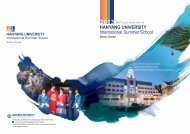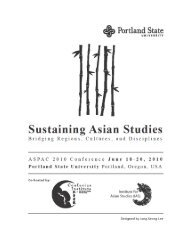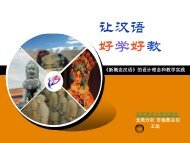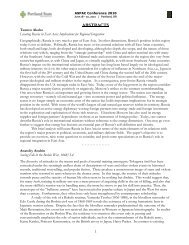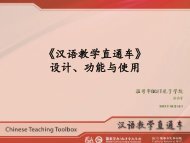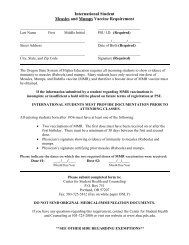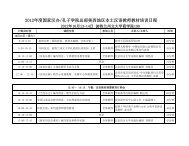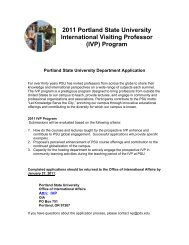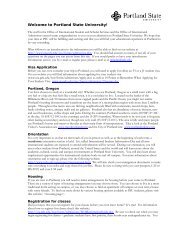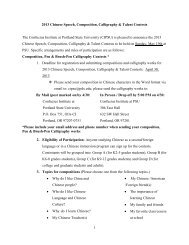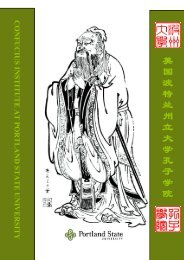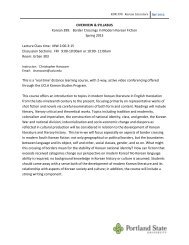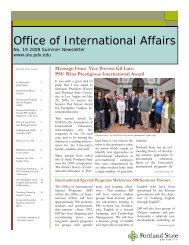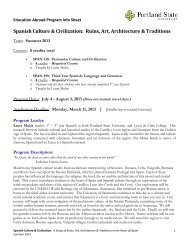Amazing China Program - Portland State University
Amazing China Program - Portland State University
Amazing China Program - Portland State University
Create successful ePaper yourself
Turn your PDF publications into a flip-book with our unique Google optimized e-Paper software.
SPONSORED BY<br />
CONFUCIUS INSTITUTE AT PORTLAND STATE UNIVERSITY<br />
CO-SPONSORED BY<br />
PORTLAND CHINESE TIMES<br />
PORTLAND STATE UNIVERSITY CHINESE STUDENT &<br />
SCHOLARS’ ASSOCIATION<br />
A CHINESE CONCERT<br />
Chinese Opera, vocal,<br />
instrumental music, and<br />
acrobatics presented by<br />
Confucius Institute of<br />
Chinese Opera at<br />
Binghamton <strong>University</strong><br />
Oregon Convention Center<br />
777 Northeast Martin Luther King Junior Boulevard,<br />
<strong>Portland</strong>, OR 97232<br />
February 9, 2013, 7:00 pm
AMAZING SONG OF CHINA: SILK: A A CHINESE CONCERT<br />
The <strong>Program</strong><br />
Face Changing 川剧变脸<br />
Sichuan opera performed by Liu Chunnuan<br />
The Drunken Royal Concubine 贵妃醉酒<br />
Beijing opera performed by Tu Linghui<br />
Message: Thoughts after Reading a Tang Poem—The Way of the<br />
Pipa 诉—读《琵琶行》有感<br />
Ambush from All Sides 十面埋伏<br />
Wang Chengzhi on pipa<br />
Acrobatics: Plate Spinning 杂技:转碟<br />
Zhang Rui<br />
The Crossroads Inn 三岔口<br />
Beijing opera performed by Liu Chunnuan and Wang Fei<br />
Demonstration on Wushu 武术演示<br />
Summit Wushu Academy<br />
The New Legend of Pipa: Composing Eighteen Laments<br />
续琵琶:制拍<br />
Kunqu opera performed by Tu Linghui<br />
Acrobatics: Barrel Contortion 杂技:钻桶<br />
Zhang Rui<br />
A Ditty from the Yimeng Mountain 沂蒙山小调<br />
Beautiful Grassland, My Home 美丽的草原我的家<br />
Heavenly Road 天路<br />
Beautiful Mood 美丽的心情<br />
Hong Zhang, mezzo-soprano<br />
Uproar in Heaven 闹天宫<br />
Beijing opera performed by Liu Chunnuan, Wang Fei, and Tu Linghui<br />
AMAZING CHINA: A CHINESE CONCERT<br />
She has been teaching at the National Academy of Chinese Theatre<br />
Arts since 2000. Authot of many articles, Wang is currently a Visiting<br />
Associate Professor of Music at Binghamton <strong>University</strong> .<br />
WANG Fei 王飞, specializing in playing wusheng<br />
(man with martial art skills) characters, has been<br />
trained to perform Beijing Opera since a very young<br />
age. After graduating from Shanxi Theatre Academy<br />
in 1999, Wang entered Beijing Opera Institution of<br />
Shanxi Province and toured France and Belgian. He<br />
has won many awards, including 2005 CCTV competition<br />
of Young Beijing Opera Performers and<br />
2008 CNTY National competition of Young Beijing<br />
Opera Performers.<br />
Hong ZHANG 张泓 holds a Master of Music degree<br />
in Voice Performance from Binghamton <strong>University</strong>,<br />
and a Bachelor of Music degree in Voice<br />
Performance from the <strong>University</strong> of Wisconsin-<br />
Madison. Currently an Instructor of Chinese and<br />
associate faculty member of Music at Binghamton<br />
<strong>University</strong>, Zhang has been an active soloist at numerous<br />
concerts and with many groups. She gives<br />
lectures and recitals on Chinese vocal music and culture as well as<br />
workshops on Teaching Chinese through Song nationwide and abroad.<br />
ZHANG Rui 张瑞 started her formal training<br />
in Chinese acrobatics since a very young age.<br />
Later, she became the principal performer for<br />
the Heilongjiang Acrobatic Troupe, one of<br />
<strong>China</strong>’s most respected acrobatic groups. And<br />
with the troupe, she began touring different<br />
countries, including Japan, Russia, Canada, and<br />
United <strong>State</strong>s. Her performance has been wellreceived<br />
and won her many awards. Since relocating to the United<br />
<strong>State</strong>s in 2001, Zhang has been devoted to promoting Chinese performing<br />
arts. She is currently a member of New York Chinese Traditional<br />
Art Center.
AMAZING CHINA: A CHINESE CONCERT<br />
AMAZING CHINA: A A CHINESE CONCERT<br />
About the Performers<br />
LIU Chunnuan 刘春暖, is a well-known Beijing<br />
Opera actor and the Artistic Director of the New<br />
York Chinese Traditional Art Center, an organization<br />
dedicated to promoting Chinese culture to the U.S.<br />
audience. After graduating from Shenyang Institute<br />
of Arts, Liu joined the Shenyang Beijing Opera<br />
Theatre in 1996 and performed Beijing Opera since.<br />
In 2005, he accepted an Appreciation Award in recognition<br />
of his outstanding contribution to the United<br />
Nations Day.<br />
Summit Wushu Academy is a high-level Chinese martial arts school,<br />
dedicated to the preservation and awareness of Wushu. Led by internationally<br />
recognized head instructors, Phillip Dang & Peter Dang, the<br />
academy provides in-depth and detailed training of Chinese martial<br />
arts.<br />
TU Linghui 涂玲慧 is a National Class-one Performer<br />
in <strong>China</strong>. She has won the 4 th Plum Blossom<br />
Award for Chinese Theatre and the 1 st Wenhua<br />
Performance Award. Besides being a fine performer,<br />
Tu also takes a stab at directing. Works<br />
directed include Tea-picking Opera Village Teamleader,<br />
Kunqu Opera The New Legend of Pipa:<br />
Composing Eighteen Laments, and many more.<br />
Among them, Beijing Opera Story of the Broken<br />
Finger and Pingju Opera Empress Zhangsun have been awarded the<br />
Class-one Performance Award at Liaoning Art Festival and Shenyang<br />
Art Festival respectively. She is currently a Visiting Professor of Theatre<br />
at Binghamton <strong>University</strong>.<br />
WANG Chengzhi 王承植, a pipa musician, is a<br />
member of Chinese Musician Association and Chinese<br />
National Orchestra Association and a National Class-<br />
Two Artist in <strong>China</strong>. Wang has won many national<br />
awards, including Best <strong>Program</strong> in the 4 th Music and<br />
Dance Festival of Fujian Province in 1984 and Outstanding<br />
Teacher in the 3 rd “Gold Lusheng” <strong>China</strong>’s<br />
National Instrumental Music Contest in 2012.<br />
<strong>Program</strong> Notes<br />
1. Face Changing 川剧变脸<br />
“Face Changing (bian lian) is an important aspect<br />
of Sichuan Opera, and the precise technique used to<br />
change masks has been a closely guarded secret. The<br />
secret has been passed down within theatre families<br />
from generation to generation.<br />
2. The Drunken Royal Concubine 贵妃醉酒<br />
It is an anecdote describing a lovers’ quarrel between<br />
Lady Yang and Emperor Xuanzong of the Tang Dynasty (618-906).<br />
Lady Yang has a banquet set up in the Imperial Garden, and then invites<br />
the Emperor to join her. But the Emperor has gone to the chamber<br />
of another royal concubine. With her heart gnawed by jealousy and anger,<br />
Lady Yang drinks by herself until she falls into a stupor.<br />
3. Message: Thoughts after Reading a Tang Poem—The Way of the<br />
Pipa 诉—读《琵琶行》有感<br />
This beautiful work pays homage to a long poem written by Bai Juyi of<br />
the Tang Dynasty (618-907). In the poem, Bai describes the sound of<br />
pipa as refined and delicate. Meanwhile, it can also display darker emotions<br />
— anger, sorrow and grief — the pipa is given a voice that transcends<br />
its cultural context.<br />
4. Ambush from All Sides 十面埋伏<br />
This famous Chinese classical score was composed on the basis of a<br />
battle in 202 B.C. between the armies of Chu and Han at Gaixia, by the<br />
Wujiang River. Through its passionate and majestic tune, the audience<br />
could almost see the fierce, desolate, solemn and stirring scenes of the<br />
battle and hear the sounds of soldiers shouting, horse galloping, and<br />
weapon striking.<br />
5. Acrobatics: Plate Spinning 杂技:转碟<br />
Plate spinning is a traditional acrobatic act dating back to the Han Dynasty<br />
(206BC-220AD). Performer spins and manipulates plates, bowls,<br />
or other flat objects on poles, without them falling off.
AMAZING CHINA: A CHINESE CONCERT AMAZING CHINA: A CHINESE CONCERT<br />
6. The Crossroads Inn 三岔口<br />
Jiao Zan, a general of the Song Dynasty (960-1279), who defends Song<br />
against the northern Jurchen invaders, is exiled to Sha Men Island.<br />
Jiao’s commander orders Ren Tanghui to disguise himself and to protect<br />
Jiao secretly. While General Jiao is staying in a small inn at the<br />
crossroad, the inn keeper Liu Lihua suspects that Ren Tanghui had<br />
come to kill Jiao. They fight in the dark, until they realize that they both<br />
are trying to protect the same man.<br />
7. Demonstration on Wushu 武术演示<br />
Wushu, translated as "martial arts" in Chinese, is the accurate term to<br />
what many people commonly know as Kung Fu. All branches of Chinese<br />
martial arts such as Taiji, Shaolin, Wudang, weapons training, etc.,<br />
fall under the umbrella term: Wushu.<br />
8. The New Legend of Pipa: Composing Eighteen Laments 续琵<br />
琶:制拍<br />
The work tells about Cai Wenji, a Han Dynasty (206BC-AD220)<br />
woman poet and composer, who was taken prisoner by the Huns and<br />
became a chieftain's wife but eventually returned home.<br />
One day, after living with the nomads for ten years, Wenji heard someone<br />
was playing hujia (nomad flute); the plaintive sound produced by<br />
the instrument reminded her of the misfortune in her life. Then she<br />
composed a long narrative poem to chant her nostalgic yearning for<br />
hometown and reluctance to tear herself away from endeared ones. The<br />
audience could feel Wenji’s deep sorrow and grief from the excerpt<br />
“Composing Eighteen Laments”.<br />
9. Acrobatics: Barrel Contortion 杂技:钻桶<br />
Barrel contortion is another popular Chinese acrobatic act. Performer<br />
moves in and out of a small barrel in various contorting moves. Flexibility<br />
is a must to perform well.<br />
10. A Ditty from the Yimeng Mountain 沂蒙山小调<br />
Lyrics: Everybody likes Yimeng Mountain because it is so pretty:<br />
a gentle breeze sweeps over sheep on the green mountain, red sorghum<br />
decorates people’s happy life. (Shangdong folksong)<br />
11. Beautiful Grassland, My Home 美丽的草原我的家<br />
Lyrics: The beautiful grasslands are my home. Steeds gallop like<br />
colorful clouds. Cows and sheep are like spreading pearls. The shepherd<br />
girl’s happy songs reach afar. (Inner Mongolian folksong)<br />
12. Heavenly Road 天路<br />
Lyrics: I stand on the high mountain at dawn, watching the railroad<br />
built in my hometown. A huge dragon flies through the mountain<br />
peaks, bringing luck and prosperity to our snowy plateau. That is a<br />
wonderful road to the sky—the mountains are no longer high and the<br />
roads are no longer far. The wine is sweet, the tea is fragrant; happy<br />
songs fly everywhere. (Tibetan folksong)<br />
13. Beautiful Mood 美丽的心情<br />
Lyrics: Wind sends the doves to the starry sky; the moon shines<br />
upon our happy dancing. Let our dreams grow auspicious wings; let<br />
beautiful moods follow us everywhere. (Modern art song)<br />
14. Uproar in Heaven 闹天宫<br />
Based on one of the Four Great Classical Novels of Chinese literature,<br />
Journey to the West, this play tells the story of how the Monkey<br />
King challenges the authority by putting Heaven in uproar. The excerpt<br />
we are going to see is how Monkey King defeats the Jade Emperor’s<br />
guards with ease. Due to its large amount of martial arts, this<br />
is one of the most popular Beijing opera repertoires.



